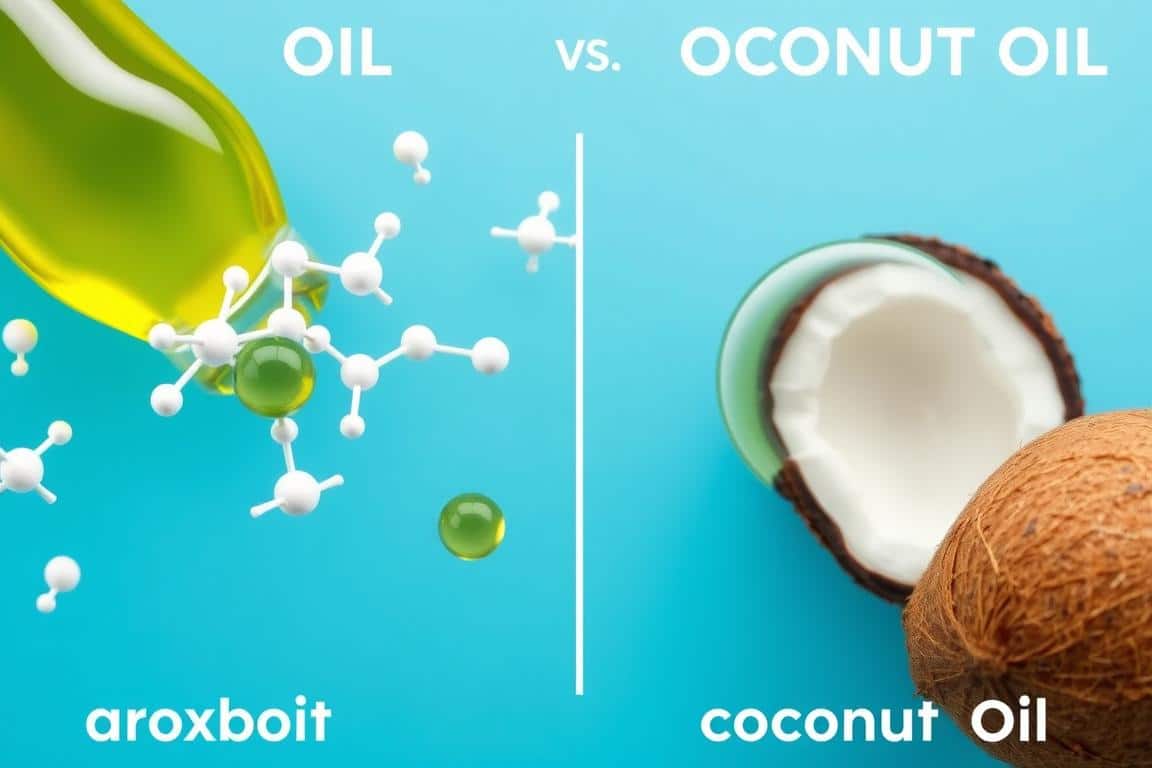10 Science-Backed Reasons Olive Oil Wins
Research consistently shows that olive oil, particularly extra virgin olive oil, offers numerous health advantages over coconut oil. Let’s examine the evidence behind these benefits.
1. Heart Health Champion
Olive oil contains predominantly monounsaturated fats, which have been shown to reduce levels of LDL (bad) cholesterol in the blood. A landmark study published in the New England Journal of Medicine found that people following a Mediterranean diet with olive oil had a 30% lower risk of major cardiovascular events compared to those on a low-fat diet.
Meanwhile, coconut oil is high in saturated fats (about 92%), which can raise LDL cholesterol levels. The American Heart Association recommends limiting saturated fat intake to less than 10% of daily calories.

2. Anti-Inflammatory Powerhouse
Extra virgin olive oil contains oleocanthal, a natural compound with anti-inflammatory properties similar to ibuprofen. A 2018 study in the International Journal of Molecular Sciences found that regular consumption of olive oil reduced inflammatory markers in the blood.
Coconut oil does have some anti-inflammatory properties, but research shows they’re not as potent as those found in olive oil.
3. Rich in Antioxidants
Laboratory analysis shows that extra virgin olive oil contains up to 18 times more antioxidants than canola oil and a staggering 700 times more than coconut oil. These antioxidants, including vitamin E, polyphenols, and squalene, help protect against oxidative stress and cellular damage.
Coconut oil contains only trace amounts of antioxidants, making it a poor source of these beneficial compounds despite marketing claims to the contrary.

4. Better for Cooking at High Heat
Contrary to popular belief, olive oil is actually more stable for cooking at high temperatures than many other oils. A 2018 Australian study found that extra virgin olive oil produced fewer harmful polar compounds when heated compared to coconut oil, despite coconut oil’s reputation for high-heat cooking.
Olive oil has a smoke point of around 410°F (210°C), making it suitable for most cooking methods including deep frying according to the USDA.
5. Supports Brain Health
The monounsaturated fats in olive oil have been linked to better cognitive function. A 2022 Harvard study found that people consuming more than half a tablespoon of olive oil daily had a 28% lower risk of dying from dementia compared to those who never or rarely consumed olive oil.
While coconut oil contains MCTs (medium-chain triglycerides) that may offer some cognitive benefits, the research is still preliminary compared to olive oil’s established brain health advantages.

Enjoying this nutritional breakdown?
If you’re finding this olive oil vs coconut oil comparison helpful, don’t forget to like and subscribe for more science-backed nutrition tips! I share new evidence-based health insights every week.
6. Weight Management Ally
Research published in the European Journal of Nutrition found that a Mediterranean diet rich in olive oil was associated with lower body weight and reduced risk of obesity. The monounsaturated fats in olive oil help increase satiety and may boost metabolic rate.
While some studies suggest coconut oil’s MCTs might aid weight loss, a comprehensive review in 2018 found insufficient evidence to support coconut oil for weight management.

7. Diabetes Risk Reduction
A large-scale study published in Diabetes Care found that consuming olive oil was associated with a 16% lower risk of type 2 diabetes. The polyphenols in olive oil help improve insulin sensitivity and glucose metabolism.
Research on coconut oil’s effects on diabetes risk is mixed, with some studies suggesting potential benefits but others showing no significant impact.
8. Gut Health Promoter
The polyphenols in olive oil act as prebiotics, promoting the growth of beneficial gut bacteria. A 2020 study in the journal Nutrients found that olive oil consumption was associated with greater gut microbiome diversity, which is linked to better overall health.
Coconut oil has some antimicrobial properties that may help fight harmful bacteria, but it doesn’t appear to support beneficial gut bacteria in the same way as olive oil.

9. Skin Health Enhancer
The vitamin E and squalene in olive oil provide powerful protection against skin damage. Research in the Journal of Dermatological Science found that olive oil’s antioxidants help prevent UV damage and may reduce signs of aging.
Coconut oil is often promoted for skin health, but some studies suggest it may disrupt the skin barrier in people with certain skin conditions like eczema.
10. Longevity Promoter
Perhaps most impressively, olive oil consumption is linked to longer life. A 2022 study in the Journal of the American College of Cardiology found that people who consumed more than half a tablespoon of olive oil daily had a 19% lower risk of cardiovascular mortality and a 17% lower risk of all-cause mortality compared to those who rarely or never consumed olive oil.
While coconut oil may offer some health benefits, there’s currently no comparable research linking it to increased longevity.

When Coconut Oil Is OK
Despite olive oil’s clear advantages for overall health, coconut oil does have its place in certain situations. Here’s when you might consider reaching for coconut oil instead:
High-Temperature Baking
While olive oil is suitable for most cooking methods, coconut oil’s mild flavor makes it ideal for baking sweet treats. Its solid state at room temperature can also provide structure to baked goods that liquid oils cannot.
Warning: Remember that coconut oil is still high in saturated fat, so moderation is key. The American Heart Association recommends limiting saturated fat to less than 10% of your daily calories.

Hair Treatments
Coconut oil has been shown to penetrate hair shafts better than other oils, making it effective for reducing protein loss and preventing damage. A study in the Journal of Cosmetic Science found that coconut oil reduced protein loss in both damaged and undamaged hair.
Application tip: Apply to dry hair before shampooing for best results, as coconut oil can repel water and prevent conditioning if applied after washing.

Skin Moisturizing
For people without sensitive skin conditions, coconut oil can be an effective moisturizer. Research in the International Journal of Dermatology found that virgin coconut oil improved skin hydration and increased lipid levels on the skin surface.
Caution: Avoid using on the face if you’re acne-prone, as coconut oil can be comedogenic (pore-clogging) for some people.

Oil Pulling
The practice of swishing oil in the mouth, known as oil pulling, may benefit oral health. A study in the Journal of Contemporary Dental Practice found that coconut oil pulling reduced plaque and gingivitis due to its antimicrobial properties.
How to use: Swish 1 tablespoon of coconut oil in your mouth for 15-20 minutes, then spit out (never swallow) and rinse thoroughly.

Olive Oil vs Coconut Oil: Head-to-Head Comparison
Let’s compare these two popular oils across key health metrics to better understand their differences:
| Health Factor | Extra Virgin Olive Oil | Coconut Oil |
| Fat Composition | 14% saturated, 73% monounsaturated, 11% polyunsaturated | 92% saturated, 6% monounsaturated, 2% polyunsaturated |
| Effect on Cholesterol | Lowers LDL (bad) cholesterol | May raise LDL cholesterol, but also raises HDL (good) cholesterol |
| Antioxidant Content | Very high (polyphenols, vitamin E, squalene) | Very low (trace amounts) |
| Smoke Point | 410°F (210°C) | 350°F (177°C) |
| Heart Disease Risk | Reduces risk | Mixed evidence, potentially increases risk |
| Weight Management | Strong evidence for benefits | Limited evidence for benefits |
The Bottom Line
When it comes to olive oil vs coconut oil for health, the scientific evidence clearly favors olive oil for most health purposes. Its rich antioxidant content, heart-healthy monounsaturated fats, and extensive research backing make it the superior choice for daily consumption and cooking.
That said, coconut oil isn’t without merit. It has specific applications where it excels, particularly in cosmetic uses and certain culinary situations. The key is understanding when each oil is appropriate and using them accordingly.
For overall health, make extra virgin olive oil your primary cooking oil and dietary fat source. Use coconut oil sparingly for specific purposes, always keeping in mind its high saturated fat content.
Remember that no single food can make or break your health. Both oils should be part of a balanced diet rich in whole foods, vegetables, fruits, lean proteins, and whole grains.

Frequently Asked Questions
Can I mix olive oil and coconut oil for cooking?
Yes, you can mix these oils for cooking. This might be useful when you want the flavor profile of coconut oil but wish to reduce its saturated fat content. However, for maximum health benefits, using olive oil alone is generally the better choice.
Is refined coconut oil healthier than virgin coconut oil?
No, virgin coconut oil is generally healthier than refined coconut oil. Virgin coconut oil is extracted from fresh coconut meat without high heat or chemicals, preserving more of its natural compounds. Refined coconut oil undergoes more processing, which removes some beneficial components.
How much olive oil should I consume daily for health benefits?
Research suggests that consuming 1-2 tablespoons (15-30 ml) of extra virgin olive oil daily provides health benefits. This is the amount typically consumed in Mediterranean regions where olive oil’s health benefits have been most extensively studied.
Does olive oil lose its health benefits when heated?
Contrary to popular belief, olive oil retains most of its health benefits when heated. While some antioxidants may be reduced, studies show that significant amounts of beneficial compounds remain even after cooking. Extra virgin olive oil is more stable at high temperatures than many seed oils due to its antioxidant content.


